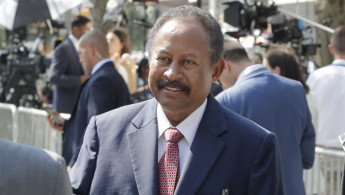Doubt lingers as Sudan PM promises peace in troubled Darfur
Sudan's prime minister has promised peace in a troubled region of the country during a visit to war-torn Darfur, even as doubts linger following decades of conflict.
Prime Minister Abdalla Hamdok, the newly installed leader following the downfall of Omar al-Bashir's regime earlier this year, met with victims of the violence in the town of Al-Fashir, the capital of north Darfur state.
Hamdok greeted the crowds with the words "freedom, peace and justice" - a slogan chanted by protestors that took to the streets across the country earlier this year in mass demonstrations that eventually ousted Bashir.
Also read: China helps Sudan launch its first ever satellite, as part of country's ambitious space programme
He assured them that Sudan's new government was working towards peace in Darfur.
"I know your demands even before you raised them," he told the crowd.
"We know the massacres that happened in Darfur... We will all work together to achieve your demands and ensure that normal life returns to Darfur."
|
|
Conflict has ravaged the region since 2003, when an ethnic minority rebel group took up arms against the government of Omar al-Bashir, accusing it of marginalising the region economically and politically.
Khartoum responded with a heavy hand against people suspected of supporting the rebels, raping, killing, looting and burning villages across Darfur.
Some 300,000 people were killed and 2.5 million displaced in the conflict, the United Nations says.
Doubts linger
Violence may have subsided in Darfur since the ouster of Omar al-Bashir, but it is still too dangerous for the families affected by the fighting to return to their homes, according to a report in Reuters.
The plight of the internally displaced persons (IDPs) highlights the challenges faced by this government in trying to promise peace.
Omar al-Bashir, the longtime ruler of the state was ousted in April after nationwide protests challenged his rule, is wanted by the International Criminal Court (ICC) for alleged war crimes and crimes against humanity in Darfur.
"We want those criminals to be given to the ICC. Without that there won't be peace in Darfur," Mohamed Adam, a prominent leader representing the victims of Darfur, told Hamdok.
Adam said the militiamen who in the early years of the conflict rampaged through the region's villages must now be disarmed.
"We also want our lands to be returned to their rightful owners," he said.
The militias that fought in the conflict have changed leaders and names, taking up new roles in Sudan’s shifting political landscape.
People in the camps told Reuters that they are worried about former Arab militia - known as the Janjaweed - that has joined the paramilitary Rapid Support Forces (RSF), the dominant military force in Khartoum since Bashir’s removal.
The commander of the RSF, Lt. General Mohamed Hamdan – known as "Hemeti" – was the commander of the Janjaweed, and holds a prominent position in the transitional government.
The Sudan Sovereign Council, as it is called, is charged with holding general elections in 2022 to transition the country towards a democracy.
Follow us on Twitter and Instagram to stay connected





 Follow the Middle East's top stories in English at The New Arab on Google News
Follow the Middle East's top stories in English at The New Arab on Google News
![The UAE is widely suspected of arming the RSF militia [Getty]](/sites/default/files/styles/image_330x185/public/2024-11/GettyImages-472529908.jpg?h=69f2b9d0&itok=Yauw3YTG)
![Netanyahu furiously denounced the ICC [Getty]](/sites/default/files/styles/image_330x185/public/2024-11/GettyImages-2169352575.jpg?h=199d8c1f&itok=-vRiruf5)
![Both Hamas and the Palestinian Authority welcomed the ICC arrest warrants [Getty]](/sites/default/files/styles/image_330x185/public/2024-11/GettyImages-2178351173.jpg?h=199d8c1f&itok=TV858iVg)